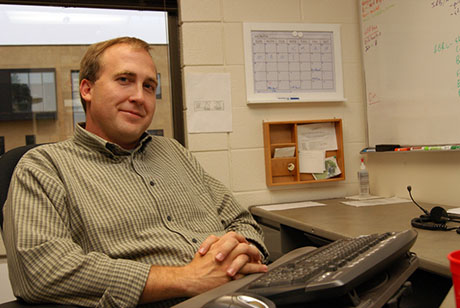FAYETTEVILLE, Ark. — Cary Deck is settling in for an Alaskan adventure as he starts his academic year as the Rasmuson Chair of Economics.
Deck, a professor of economics and director of the Behavioral Business Research Laboratory at the Sam M. Walton College of Business, is spending the fall and spring semester at the University of Alaska Anchorage as the prestigious chair at that university’s Experimental Economics Lab.
It’s a change of climate and scenery for Deck, but one thing that will never change is his passion for behavioral research.
“It’s a great opportunity to interact with people at another lab and look for best practices that can be brought back to the Behavioral Business Research Laboratory,” Deck said.
While much of his regular research will continue in Anchorage, Deck expects to become involved with work focusing on resource issues since Alaska is a state that values its natural resources as much as Arkansas does. “They have a great group of scholars up there working to understand incentives in fisheries, the petroleum industry, and other common pool resource situations,” Deck said.
At the Walton College, Deck’s work includes research on:
- How evolving technology changes pricing dynamics in retail markets.
- How people make risk decisions and what influences those choices.
- How the structure of contests (such as patent races or promotion tournaments) impacts strategic behavior.
“I’m really looking forward to being part of the research group there and exploring new ideas,” Deck said. While he is excited to see what other researchers are doing, he is also happy to get to highlight the work being done at Walton College. This interaction is not limited to people already in Alaska. As the visiting chair, Deck will have the opportunity to invite other scholars from around the country to visit Anchorage.
There are many similarities between the labs at the University of Alaska and the University of Arkansas. Both encourage research collaboration and emphasize engaging students in research. In short, “this opportunity should have benefits for faculty and students at both colleges,” Deck said.
As the sixth Rasmuson Chair of Economics, Deck succeeds some of the most highly honored researchers in his field. In 2003, renowned economics professor Vernon Smith was named as the first visiting Rasmuson Chair at the University of Alaska. Smith, a 2002 Nobel Laureate in Economics, was Deck’s mentor and academic adviser while Deck earned his doctorate at the University of Arizona in 2001. Known as the founding father of experimental economics, Smith now serves as professor of economics and law at Chapman University in California, where Deck is a research professor. Deck takes over from 2014-15 Rasmuson Chair Jason Shogren, a former member of the Intergovernmental Panel on Climate Change. Shogren is an economics professor from the University of Wyoming and served as adviser to then-President Clinton.
Deck is married to Kathy Deck, the well-known Arkansas and regional economist, who will continue to serve as the director of Walton’s Center for Business and Economic Research. When asked how she felt about him spending a year in Alaska, he replied, “Kathy recognizes that this is a great opportunity for me personally and professionally. We have not figured out exactly how it will all work, but we will.” Their 12-year-old son, Josh, will spend at least part of the year on this adventure in Alaska. “He’s going to miss his friends, but he is excited about getting to experience new things and make new friends.”
About the University of Arkansas: The University of Arkansas provides an internationally competitive education for undergraduate and graduate students in more than 200 academic programs. The university contributes new knowledge, economic development, basic and applied research, and creative activity while also providing service to academic and professional disciplines. The Carnegie Foundation classifies the University of Arkansas among only 2 percent of universities in America that have the highest level of research activity. U.S. News & World Report ranks the University of Arkansas among its top American public research universities. Founded in 1871, the University of Arkansas comprises 10 colleges and schools and maintains a low student-to-faculty ratio that promotes personal attention and close mentoring.
Contacts
David L. Speer, Director of Communications
Sam M. Walton College of Business
479-575-2539, dlspeer@uark.edu
